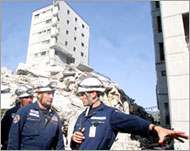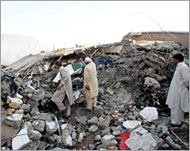Pakistanis search for quake survivors
Rescuers continued to search frantically in the rubble of flattened towns and villages for survivors of an earthquake that killed more than 20,000 people in northern Pakistan and India.

In worst-hit Pakistan, more than 24 hours after Saturday morning’s quake, hundreds of children were trapped in collapsed schools and 150 people were buried in two flattened apartment blocks in the capital, Islamabad.
Rescue teams and ordinary citizens laboured with cranes and excavators or used their bare hands in desperate searches for survivors, some complaining bitterly about a lack of assistance from badly stretched central authorities.
Pakistan’s president, General Pervez Musharraf, said there were difficulties reaching remote areas. He said Pakistan needed blankets and tents, transport helicopters and medicines, while Prime Minister Shaukat Aziz said it also needed financial help.
“This was a major earthquake, a major catastrophe, which has caused huge devastation,” Aziz said after flying over the area.
Pakistan has declared three days of national mourning.
Huge toll
The 7.6-magnitude quake was centred in forested mountains of Pakistani Kashmir and jolted large parts of the north, as well as parts of neighbouring Afghanistan and India.
About 19,400 people were killed and more than 42,000 hurt in Pakistan, said Interior Minister Aftab Ahmed Khan Sherpao. Pakistan’s side of the divided Himalayan territory of Kashmir and its main city of Muzaffarabad were worst hit.
Another 689 people died in Indian Kashmir, where many mud and stone houses were buried under landslides.
The communications minister for Pakistani Kashmir, Tariq Farooq, said the toll there alone could reach 30,000.
 |
|
Professional rescue teams |
Pakistani military spokesman Major General Shaukat Sultan said the devastation was the worst in Pakistan’s history.
“There are many villages that have been wiped off the face of this Earth,” he said.
Amongst countless tragic sights, perhaps most pitiful was that of hundreds of parents using picks, shovels and their bare hands in a desperate attempt to reach 850 children trapped in the rubble of two schools in North West Frontier Province.
The frightened voices of trapped children and the anguished wails of parents accompanied the frantic work in the Balakot valley in the mountains of the province bordering Afghanistan.
Pledges
In response to the disaster, the US said it would provide eight military helicopters to get emergency relief to affected communities and two C-130 transport planes with blankets, tents and other supplies.
 |
|
Few of those caught in rubble in |
The World Bank offered $20 million and the European Union earmarked an initial €3.6 million ($4.36 million) while China said it was donating $6.2 million in cash and materials.
Turkey, which has suffered major earthquakes, said it had sent two military planes carrying aid, doctors and rescue workers and, in a further sign of easing tensions, Indian Prime Minister Manmohan Singh called Musharraf to offer assistance.
Rescue efforts have been hampered by frequent aftershocks causing panic among survivors, many of whom face a bleak immediate future with little or no food or shelter.
Mass destruction
“I’ve been involved in helping refugees for the last 17 years, but I am in shock because I have never seen such devastation,” said German aid agency doctor Chris Schmoter in Balakot, where almost every second woman or child bore an injury.
One journalist counted 105 bodies during an eight kilometre trek into the town. Some were laid by the road by relatives hoping for help with their burial. Others were carried on charpoys, traditional rope beds.
A boy carried a younger sister of perhaps four or five, her skin stripped off her face and the side of her body by a rock that flattened their house. He did not know what to do.
“There are no bandages or anything at all,” he said. “There are no doctors, no nothing – where should we go?”
Aid coordination
Oxfam media spokesperson Shaista Aziz, speaking from Islamabad, praised the coordination of the aid agencies.
She said Oxfam is providing water and sanitation and working with local non-governmental organisations (NGOs) to hand out 60,000 thermal tents and 300,000 blankets over the next few days in the North West Frontier Province and Pakistan-administered Kashmir.
But the greatest difficulties faced by the relief operation are the mountainous terrain and the cold night-time temperatures.
The Pakistani government has appealed for helicopters, while Musharraf asked the Pakistani diaspora to dig deep. Aziz said 100,000 sterling ($176,000) was raised by Oxfam.
On Sunday night, hospitals in Islamabad were being forced to wheel patients outside due to the aftershocks and the fear of further collapses.
“Everyone is still very shocked and desperately trying to find out about their relatives,” she said. “This is going to be a very big aid response.
“A team of four water and sanitation experts are flying out, and we already have two assessment teams on the ground.”